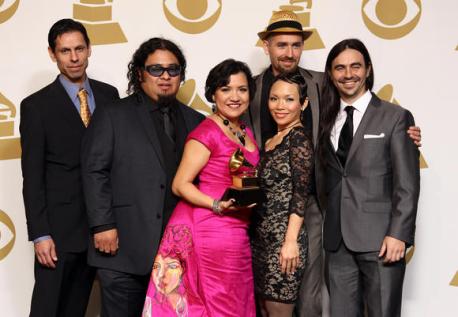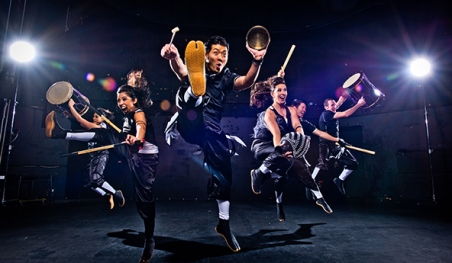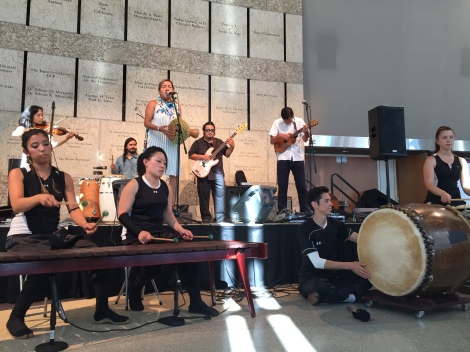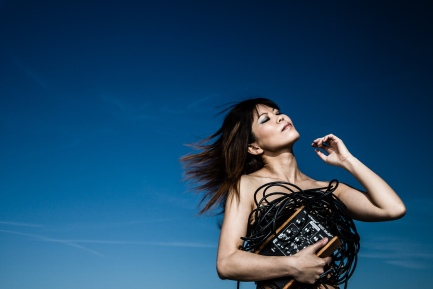
By Sheri Linden
A golf tee, a metal screw and a ruler — not the first things that come to mind when the subject is music. But each of these items had its moment in the spotlight during my recent chat with Motoko Honda, a composer/performer whose sonic improvisations have drawn ecstatic comparisons to Radiohead, John Cage and Prokofiev.
As she spoke from her home studio in Oakland on a recent Friday afternoon, the occasional digital glitches in our Skype connection did nothing to dampen Honda’s enthusiasm. Besides sharing background info on her upcoming Angel City Jazz Festival/Ford on the Road performance with Hanoi-born musician and Oscar nominee Vanessa Vo (a.k.a. Vân-Ánh Vanessa Võ), Honda offered an exuberant lesson in extended technique and prepared piano after I confessed to being unfamiliar with those terms.
“I can show you!” Honda said with a beaming smile. After playing a few notes, she inserted that golf tee into the workings of her piano — transforming the instrument into a “prepared piano” — and then demonstrated how those same notes deepened and changed.
It’s one of many extended, or unconventional, techniques that Honda uses in her holistic approach to music, which combines the acoustic keyboard with a range of electronic devices that manipulate sound. She’s been hailed as a virtuoso of this hybrid strategy. But Honda wasn’t always a fan of plugged-in music. “I actually didn’t like electronic music at all when I was young,” she says.
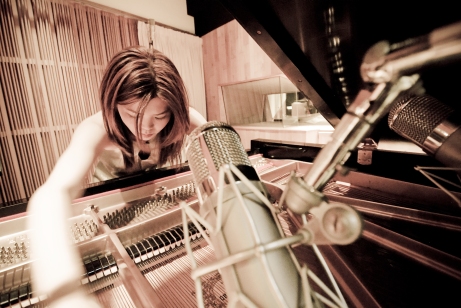
At the same time, she felt increasingly frustrated by piano’s limitations and longed to play “between the notes.” Inspiration struck when Honda, who was born in Yokohama and raised in the northern Japanese city of Sendai, was a graduate student at CalArts. “I saw guitarists playing all sorts of things using their stomp box. They can change the texture, they can change the tone, they can bend the sound.” Maybe, she thought, she could do the same with her piano.
Further demonstrations during our conversation made clear that she could do just that. With a simple screw placed just so, she gave her piano the metallic clang of a bell. Most impressive, though, was the soul-stirring power of an excerpt from the piece she’s writing with Vo for their October 3 performance. The brief musical passage churned with suggestions of thunder and then gave way to a lyrical section evoking the rippling of water.
Water is one of the motifs that Honda and Vo explore in their first collaborative composition. “We have such a close connection to water in our countries,” Honda says, noting that California’s drought lends additional resonance to the subject. She acknowledged with a laugh that the piece was still untitled as of mid-September, two weeks before its world premiere performance at the Barnsdall Gallery Theatre in Barnsdall Park.
Honda likens their collaboration to storytelling with a personal slant. Although they’re from different countries, she and Vo share points of reference as Asians who emigrated to the States. “We still have memories about who we were in our countries,” Honda says, adding that their joint composition expresses a sense of “reaching out,” not just in terms of the distance they traveled to the US, but a reaching out “to the audience, to ourselves, to each other.”
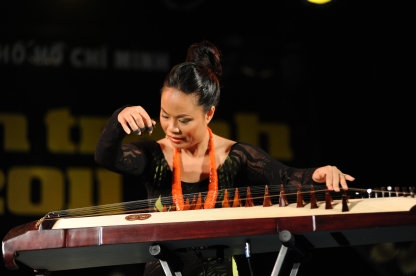
For Honda, that distance traveled was a bold leap: from northern Japan to central Kansas, where, with little English and no friends or family in the area, she enrolled in tiny Bethany College. Her teachers in Japan had expected her to attend a high-profile East Coast conservatory. But Honda, overwhelmed by the time-consuming nature of classical training and competition, determined to study anything but music.
“My life had disappeared into music, and I no longer existed,” Honda says. In Lindsborg, Kansas, she “learned to become a person again.” Supportive and nurturing friendships eventually brought her back to the piano, with a fresh sense of balance.
One of the things she and Vo have in common is their resolve to enjoy their careers without sacrificing their personal lives — a challenge for women in particular. “In the long run, we want to celebrate and enjoy life, and we see life as the source of music.”
Like Honda, Vo uses extended technique on acoustic instruments. Their Barnsdall performance will incorporate three traditional Vietnamese instruments: the dan tranh zither (Vo’s a national champion in Vietnam); the dan bau, a monochord, or single-string, zither that can sound like the human voice; and the dan trung, a bamboo xylophone. Vo, who often performs with the Kronos Quartet, will also sing.
For all their complex layers of sound and ideas, the two musicians aim for simplicity in execution, and an experience that’s open to listeners of all ages and musical tastes.
“It’s not about trying to play Eastern or Western music but really trying to be true to our feelings,” Honda says. “It’s almost like my identity. As a pianist, I think as a Western person, but my soul is in Japan. I don’t know which one I am, but I like both.”
Motoko Honda & Vanessa Vo perform as part of the Angel City Jazz Festival on October 3 at 8:00 PM at Barnsdall Gallery Theatre. The evening will also include performances by Jen Shyu & Jade Tongue with Ambrose Akinmusire and Mat Maneri. Tickets are $15-$20.

